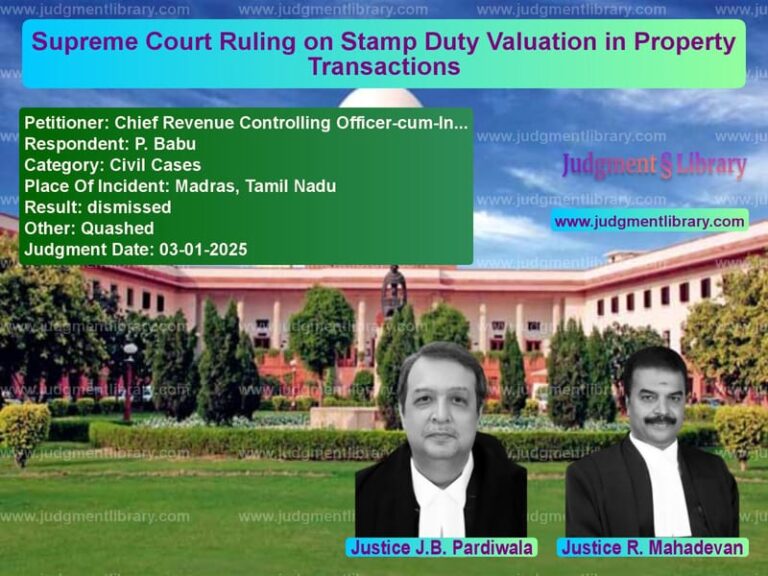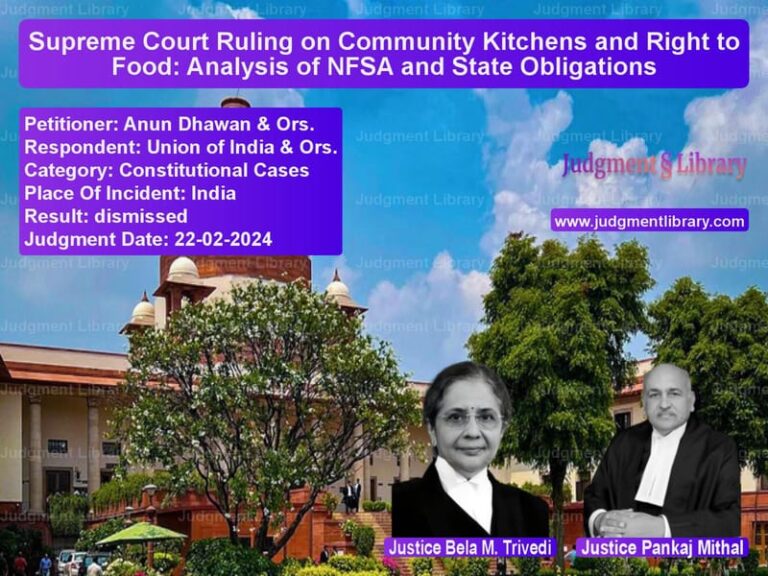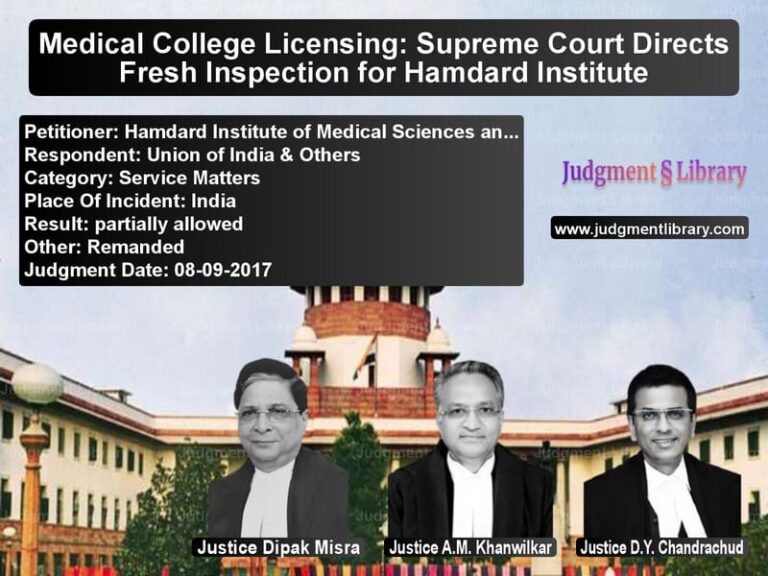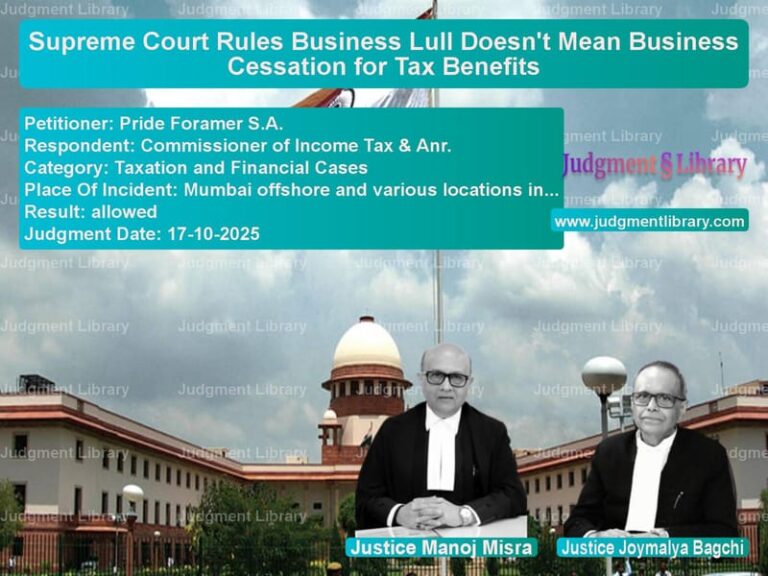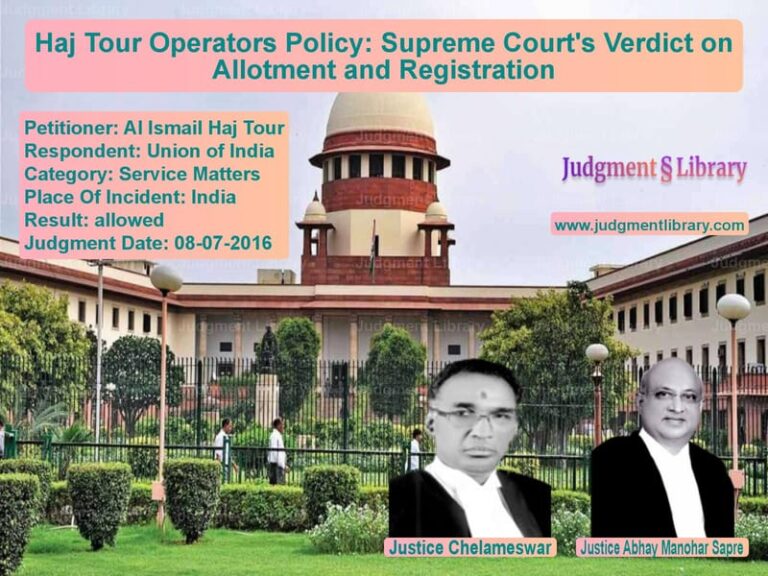Delhi Transport Corporation vs. Ashok Kumar Sharma: Supreme Court Upholds Tribunal’s Order on Unlawful Dismissal
The case of Delhi Transport Corporation (DTC) vs. Ashok Kumar Sharma revolves around the wrongful dismissal of an employee and the legal principles surrounding disciplinary proceedings in public sector employment. The Supreme Court reaffirmed the importance of procedural fairness and independent application of mind by disciplinary authorities before imposing severe penalties like dismissal from service.
The controversy began when DTC dismissed Ashok Kumar Sharma from service on April 29, 2009, just before his retirement, based on a disciplinary enquiry. The dismissal was later challenged, and both the Central Administrative Tribunal (CAT) and the Delhi High Court ruled in favor of Sharma. DTC appealed the decision before the Supreme Court, which upheld the findings of the Tribunal and the High Court.
Background of the Case
The case originated from disciplinary proceedings initiated against Ashok Kumar Sharma, an employee of DTC. A charge sheet was issued on December 19, 2006, leading to an enquiry conducted by the Central Vigilance Commission. The Enquiry Officer found seven out of eight charges against Sharma to be proved.
Following this, a show cause notice was issued to Sharma on April 15, 2009, proposing his dismissal. Sharma, however, challenged this notice before the Tribunal, arguing that the Chairman-cum-Managing Director (CMD) of DTC, who issued the show cause notice, lacked the authority to do so.
Arguments by Delhi Transport Corporation
DTC, represented by its counsel, Ms. Monika Gusain, argued that:
- The Board of Directors had collectively reviewed the charges and approved Sharma’s dismissal.
- The show cause notice was issued due to the urgency of Sharma’s impending retirement.
- The Board had the discretion to make final decisions on disciplinary matters.
Arguments by Ashok Kumar Sharma
Sharma, appearing in person, countered DTC’s claims, stating that:
- The Board of Directors had not independently reviewed his case and merely approved a pre-decided penalty.
- The dismissal order lacked any detailed reasoning or independent consideration of the charges.
- The enquiry process was flawed, as no prosecution witnesses were examined.
Supreme Court’s Observations
The Supreme Court found several legal flaws in DTC’s decision-making process. It observed:
- The disciplinary authority must apply independent judgment and provide an opportunity for the charged officer to be heard before imposing a major penalty.
- The Board of Directors’ resolution approving Sharma’s dismissal lacked any detailed reasoning, suggesting non-application of mind.
- The enquiry proceedings were fundamentally flawed as no prosecution witnesses were examined.
Referring to its earlier ruling in Roop Singh Negi v. Punjab National Bank (2009), the Court reiterated that even in ex-parte enquiries, some evidence must be led by the department to substantiate charges.
Legal Analysis and Precedents
The Supreme Court delved into established legal precedents to analyze whether the disciplinary action met the requirements of procedural fairness.
1. Lack of Application of Mind by Disciplinary Authority
The Court relied on A.L. Kalra v. Project & Equipment Corporation of India Ltd. (1984) 3 SCC 316, where it was held:
“The disciplinary authority must indicate an independent application of mind to the findings in the enquiry report followed by an opportunity of hearing to the charged officer before imposing any major penalty.”
The Supreme Court found that in Sharma’s case, the Board merely ratified the decision without considering the specifics of the charges.
2. Enquiry Report Based on No Evidence
The Court also cited Roop Singh Negi v. Punjab National Bank (2009) 2 SCC 570, stating:
“Even in an ex-parte enquiry, the department must lead evidence to establish the charges against the delinquent employee.”
Since no witnesses were examined, the Court concluded that the enquiry report lacked evidentiary value.
Conclusion
The Supreme Court dismissed DTC’s appeal and upheld the Tribunal’s and High Court’s decisions. It emphasized the necessity for disciplinary authorities to follow due process before imposing major penalties like dismissal.
This ruling serves as a crucial precedent, reinforcing the principles of natural justice and fair disciplinary procedures in public sector employment.
Petitioner Name: Delhi Transport Corporation.Respondent Name: Ashok Kumar Sharma.Judgment By: Justice Sandeep Mehta, Justice R. Mahadevan.Place Of Incident: Delhi.Judgment Date: 18-07-2024.
Don’t miss out on the full details! Download the complete judgment in PDF format below and gain valuable insights instantly!
Download Judgment: delhi-transport-corp-vs-ashok-kumar-sharma-supreme-court-of-india-judgment-dated-18-07-2024.pdf
Directly Download Judgment: Directly download this Judgment
See all petitions in Disciplinary Proceedings
See all petitions in Termination Cases
See all petitions in Public Sector Employees
See all petitions in Judgment by Sandeep Mehta
See all petitions in Judgment by R. Mahadevan
See all petitions in dismissed
See all petitions in supreme court of India judgments July 2024
See all petitions in 2024 judgments
See all posts in Service Matters Category
See all allowed petitions in Service Matters Category
See all Dismissed petitions in Service Matters Category
See all partially allowed petitions in Service Matters Category


